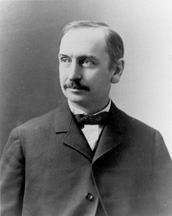Theodore E. Burton
| Theodore E. Burton | |
|---|---|
 |
|
|
United States Senator from Ohio |
|
|
In office December 15, 1928 – October 28, 1929 |
|
| Preceded by | Cyrus Locher |
| Succeeded by | Roscoe C. McCulloch |
|
In office March 4, 1909 – March 3, 1915 |
|
| Preceded by | Joseph B. Foraker |
| Succeeded by | Warren G. Harding |
| Member of the U.S. House of Representatives from Ohio's 22nd district |
|
|
In office March 4, 1921 – December 15, 1928 |
|
| Preceded by | Henry I. Emerson |
| Succeeded by | Chester C. Bolton |
| Member of the U.S. House of Representatives from Ohio's 21st district |
|
|
In office March 4, 1895 – March 3, 1909 |
|
| Preceded by | Tom L. Johnson |
| Succeeded by | James H. Cassidy |
|
In office March 4, 1889 – March 3, 1891 |
|
| Preceded by | Martin A. Foran |
| Succeeded by | Tom L. Johnson |
| Personal details | |
| Born |
Theodore Elijah Burton December 20, 1851 Jefferson, Ohio |
| Died | October 28, 1929 (aged 77) Washington, D.C. |
| Political party | Republican |
| Alma mater | Grand River Institute, Austinburg, Ohio; Iowa College, Grinnell, Iowa; Oberlin College |
| Signature |  |
Theodore Elijah Burton (December 20, 1851 – October 28, 1929) was a Republican politician from Ohio. He served in the United States House of Representatives and U.S. Senate.
Burton was born in Jefferson, Ashtabula County, Ohio, the son of Elizabeth (Grant) and The Rev. William Burton. He attended the public schools, Grand River Institute, Austinburg, Ohio, and Iowa College, Grinnell, Iowa. He graduated from Oberlin College in 1872. He studied law in Chicago with Lyman Trumbull, friend of Lincoln, and Senator of the United States for eighteen years. He commenced the practice of law in 1875, becoming a prominent attorney in Cleveland. His first public office was member of Cleveland City Council.
He was elected to the House of Representatives for the Fifty-first United States Congress in 1888 from the Ohio 21st District in Cleveland. but was defeated for re-election in 1890. He was not the Republican nominee in 1892, but was nominated again in 1894 and won election to the Fifty-fourth United States Congress. He was re-elected seven times, serving in the House until 1908.
He was noted for his work in preserving Niagara Falls and for opposing wasteful waterways projects. President Theodore Roosevelt appointed him chairman of the Inland Waterways Commission in 1907 and the National Waterways Commission in 1909. He also sponsored the legislation authorizing construction of the Panama Canal.
...
Wikipedia
